Ukrainian journalist documenting Russian occupation dies in prison
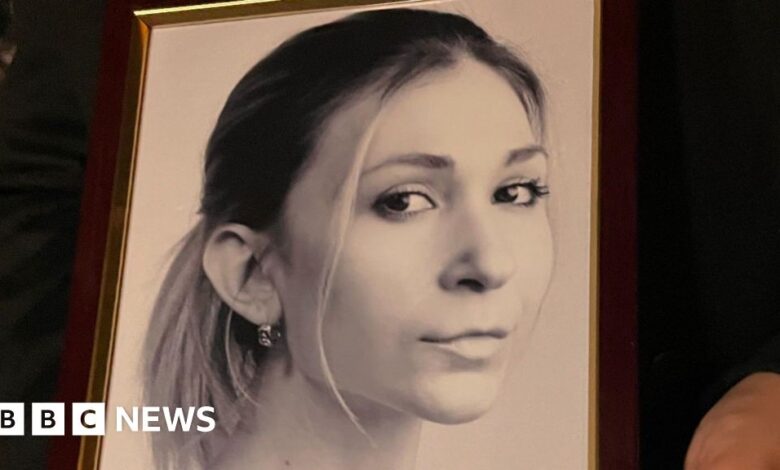
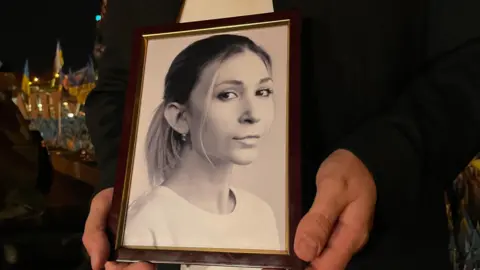 BBC
BBCViktoriia Roshchyna disappeared in August 2023 in a region of Ukraine currently occupied by Russian forces.
It took nine months for Russian authorities to confirm that the journalist had been detained. They did not give a reason.
This week, her father received a terse letter from the Ministry of Defense in Moscow informing him that Victoria had died at the age of 27.
The document said the journalist’s body would be returned in one of the exchanges organized by Russia and Ukraine for soldiers killed on the battlefield. The date of death given is September 19.
Again, no explanation.
Night of prayer for Viktoria
This weekend, friends gathered to remember Viktoriia on the Maidan in central Kyiv. They shuffled into position on the steps holding her photo, her young face smiling at the small crowd.
“She has great courage,” one woman began her praise.
“We will miss her terribly,” another said, turning away as her eyes filled with tears.
Viktoriia’s stories are snapshots of life that Ukrainians cannot get from anywhere else.
Reporting from the occupied areas of Ukraine was extremely dangerous, but her colleagues remembered how desperate she was to get there, even after she was detained for the first time for ten days.
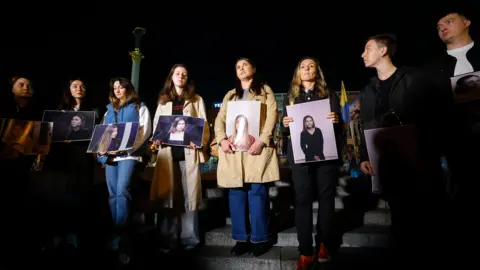 SERGEY DOLZHENKO/EPA
SERGEY DOLZHENKO/EPA“Her parents often called and told us to stop deploying her, but we never deployed her!” one of her former bosses recalls.
“All her editors tried to stop her. But that is impossible.”
The young reporter eventually went freelance on her own, and when she returned, the press would buy her articles.
Most notably, she never used a pseudonym despite writing publicly about “occupied” territory and calling Russian collaborators “traitors.”
“She wanted to provide information about how those cities were being besieged by the Russian army,” Sevgil Musaieva, editor-in-chief of Ukrayinska Pravda, told the BBC.
“She is truly amazing.”
detention
Viktoriia’s father previously described how she departed through Poland and Russia last July to reach occupied Ukraine.
It was a week later when she called to say she had been questioned at the border for several days.
All we knew for sure then was that in May she was detained at Detention Center No. 2 in Taganrog, southern Russia – a facility notorious for its brutal treatment of many people Ukraine to the point that some call it “Russia’s Guantanamo Prison”.
According to the Media Initiative for Human Rights, another Ukrainian citizen released from Taganrog last month told Viktoriia’s family that she met the journalist on September 8 or 9.
Then there is reason to hope.
“I am 100% sure she will return on September 13 this year. My sources guarantee it 100%,” said Musaieva, from Ukrayinska Pravda.
She had been informed that Viktoriia would be included in one of the routine prisoner of war exchanges that Ukraine and Russia carry out, scheduled for the middle of last month.
“So what happened to her in prison? Why doesn’t she come home?”
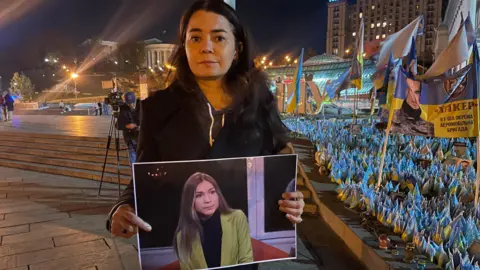
Viktoriia was touched along with another Ukrainian woman, but neither was included in the prisoner exchange.
“It means she was taken somewhere else,” said Media Initiative Director Tetyana Katrychenko. They told Lefortovo. Why be there? We don’t know.”
She said that was not normal practice before the swap.
Lefortovo prison in Moscow is run by the FSB security service and is used to detain people accused of espionage and serious crimes against the state.
“Maybe they took her there to start some sort of court proceeding or investigation. That happened to other civilians captured from Kherson and Melitopol,” Tetyana said.
The BBC understands that Viktoriia’s father spoke to her in prison on August 30.
At one point, she called for a hunger strike, but that day her father urged her to start eating again and she agreed.
“That needs to be investigated. It also means that we will partly blame her and not the Russian Federation as we should,” Tetyana warned.
Ukraine’s intelligence service confirmed Viktoriia’s death and the Prosecutor General’s office converted the criminal case from illegal detention to murder.
In Russia, Viktoriia has never been charged with a crime and the circumstances of her detention are unknown.
“A civilian journalist… was detained by Russia. Then Russia sent a letter saying she was dead? Ukrainian MP Yaroslav Yurchyshyn told the BBC in Kyiv.
“It’s killing. Just killing hostages. I don’t know another word.”
Nga has not commented.
civilian hostages
Since the beginning of Russia’s full-scale invasion, large numbers of civilians have been removed from areas of Ukraine that Moscow overran and now controls.
Like Viktoriia’s family, desperate relatives have little or no information about their whereabouts or health status and do not know whether they will be able to return home.
So far, the Media Initiative has collated a list of 1,886 names.
“There were all kinds of people, including military veterans, police officers and local officials like the mayor,” Tetyana said.
“And of course there may be more that we don’t know.”
Neither lawyers nor the Red Cross were approached, and even if someone’s location could be confirmed, returning them home was almost impossible: civilians were rarely exchanged.
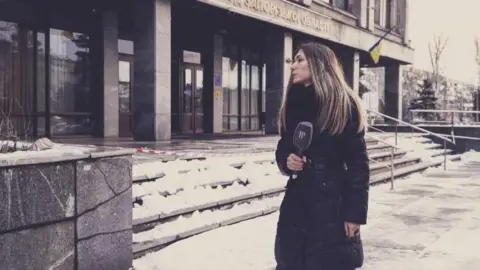 Nataliya Humenyuk/Hromadske
Nataliya Humenyuk/HromadskeViktoriia’s friends and colleagues say they will not rest until they find out what happened.
“Her life is her work,” says Angelina Karyakina, a former editor at Hromadske. “Rarely do people have such determination.”
“I’m pretty sure the way she wanted us to remember her was not by standing here and crying but by remembering her dignity,” she said.
“And I think it’s important for us journalists to find out what she’s doing — and get her story done.”





